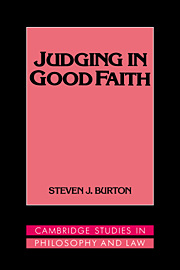Crossref Citations
This Book has been
cited by the following publications. This list is generated based on data provided by Crossref.
Leiter, Brian
1995.
Legal Indeterminacy.
Legal Theory,
Vol. 1,
Issue. 4,
p.
481.
Anderson, Bruce
1996.
“Discovery” in Legal Decision-Making.
Vol. 24,
Issue. ,
p.
1.
Shytov, Alexander Nikolaevich
2001.
Conscience and Love in Making Judicial Decisions.
Vol. 54,
Issue. ,
p.
105.
Pettys, Todd E.
2002.
Federal Habeas Relief and the New Tolerance for 'Reasonably Erroneous' Applications of Federal Law.
SSRN Electronic Journal ,
Delaney, David
2003.
Law and Nature.
Bertea, Stefano
2004.
Certainty, reasonableness and argumentation in law.
Argumentation,
Vol. 18,
Issue. 4,
p.
465.
Bertea, Stefano
2004.
Certainty, reasonableness and argumentation in law.
Argumentation,
Vol. 18,
Issue. 4,
p.
465.
Warner, Richard
2005.
The Blackwell Guide to the Philosophy of Law and Legal Theory.
p.
259.
Lindquist, Stefanie A.
and
Klein, David E.
2006.
The Influence of Jurisprudential Considerations on Supreme Court Decisionmaking: A Study of Conflict Cases.
Law & Society Review,
Vol. 40,
Issue. 1,
p.
135.
2008.
Demystifying Legal Reasoning.
p.
1.
2008.
Demystifying Legal Reasoning.
p.
27.
Furgeson, Joshua R.
Babcock, Linda
and
Shane, Peter M.
2008.
Behind the mask of method: Political orientation and constitutional interpretive preferences..
Law and Human Behavior,
Vol. 32,
Issue. 6,
p.
502.
2008.
Demystifying Legal Reasoning.
p.
64.
Furgeson, Joshua R.
Babcock, Linda
and
Shane, Peter M.
2008.
Do a law's policy implications affect beliefs about its constitutionality? An experimental test..
Law and Human Behavior,
Vol. 32,
Issue. 3,
p.
219.
2009.
Judicial Review in an Age of Moral Pluralism.
p.
22.
2009.
Judicial Review in an Age of Moral Pluralism.
p.
172.
2009.
Judicial Review in an Age of Moral Pluralism.
p.
1.
Zeisberg, Mariah
2009.
Should We Elect the US Supreme Court?.
Perspectives on Politics,
Vol. 7,
Issue. 4,
p.
785.
Reeves, Anthony R.
2010.
Do Judges Have an Obligation to Enforce the Law?: Moral Responsibility and Judicial-Reasoning.
Law and Philosophy,
Vol. 29,
Issue. 2,
p.
159.
Bertea, Stefano
2012.
Certainty, Reasonableness and Argumentation in Law.
SSRN Electronic Journal,



